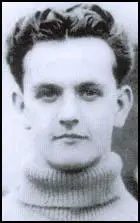Ken Campbell

Kenneth Campbell was born in Cambuslang, Scotland, on 6th September 1892. A talented goalkeeper, he played local football before signing for Liverpool in May 1911.
Campbell made his debut for the club against Blackburn Rovers in February 1912 when he replaced the injured Sam Hardy. On 7th December, 1912, Campbell was in goal when Sunderland beat Liverpool 7-0. According to Charlie Buchan, who scored five of the goals that day, Campbell was in outstanding form and but for him the Sunderland total would have been in double figures.
Liverpool had a good FA Cup run in the 1913-1914 season beating Gillingham (2-0), West Ham United (5-1), Queen's Park Rangers (2-1) and Aston Villa (2-0) to reach the final against Burnley. The final took place at Crystal Palace and the Liverpool team included Campbell, Tom Fairfoul, Tommy Miller, Jackie Sheldon and Bob Pursell. Liverpool lost the game 1-0.
According to Tony Matthews (Who's Who of Liverpool): "Campbell was cool, confident and ultra-reliable. A very modest man, he was adept at dealing with ground shots and was also brave, thinking nothing about diving at a player's feet or flying, fists at the ready, into a ruck of attackers at set pieces."
Campbell won his first international cap for Scotland against Wales on 26th February, 1920. The game ended in a 1-1 draw. Later that season he played against Northern Ireland (3-0) and England (5-4).
After playing 125 games for Liverpool Campbell joined Partick Thistle in the Scottish League in April 1920. The following season he won a Scottish Cup winners medal. He also played for his country against Wales (2-1), Northern Ireland (2-0), Wales (1-2), Northern Ireland (2-1) and England (1-0).
In 1922 Campbell returned to England to play for New Brighton Tower. He opened a sports shop in nearby Wallasey later that year. Campbell also played for Stoke City (1923-1925) and Leicester City (1925-1929).
Kenneth Campbell died in Macclesfield on 28th April 1971.
Primary Sources
(1) Tony Matthews, Who's Who of Liverpool (2006)
Campbell was cool, confident and ultra-reliable. A very modest man, he was adept at dealing with ground shots and was also brave, thinking nothing about diving at a player's feet or flying, fists at the ready, into a ruck of attackers at set pieces.
(2) John Hudson, Sunderland: The Official History (1999)
The date was 7th December, 1912, the score 7-0...For Charlie Buchan it was a personal triumph. Strangely, the man of the match was Liverpool's goalkeeper Campbell, who was outstanding; but for him it would have been double figures for Sunderland. There were clear opportunities early on for both sides, but it was Sunderland who took the lead. From a quick break Hall ran away, laid off the ball to Buchan, who with a swift low shot opened the scoring... Buchan coolly slotting home a cross from Martin. After the interval the Lads were straight on the attack looking for more goals. Nevertheless, it took until 21 minutes after break for the fifth goal, Buchan once again the man, registering his hat trick after converting a left-wing cross. Five minutes later and Buchan was beginning to make it a one-man show. Mordue took a corner, flighting it in beautifully, and after Campbell parried a shot, Buchan lashed the loose ball into the back of the net for the sixth. Having totally outclassed the opposition, we now took it easy, but with only four minutes left Holley strolled down the wing and crossed to Buchan who put in his fifth goal, and Sunderland's seventh.
